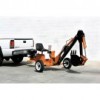Harbor Freight Tools 62365 User Manual - Page 19
SAE Viscosity Grades, Average outdoor temperature
 |
View all Harbor Freight Tools 62365 manuals
Add to My Manuals
Save this manual to your list of manuals |
Page 19 highlights
Fuel Filter Replacement (if equipped) WARNING! TO PREVENT SERIOUS INJURY FROM FIRE OR EXPLOSION: Fill the fuel tank in a well-ventilated area away from ignition sources. If the engine is hot from use, shut the engine off and wait for it to cool. Do not smoke. 1. Wear protective gear including, ANSIapproved safety goggles, NIOSH-approved dust mask/respirator, and nitrile gloves. 2. Clean the Fuel Cap and the area around it. 3. Remove Fuel Filter (6R). Reattach Fuel Cap to prevent debris from entering into Gas Tank. 4. Remove Fuel Strainer. Wash with warm water and light detergent. Flush and let dry. 5. Reinstall in the Gas Tank. Engine Oil Change CAUTION! Oil is very hot during operation and can cause burns. Wait for engine to cool before changing oil. 1. Make sure the engine is stopped and is level. 2. Close the Fuel Valve. 3. Place a drain pan (not included) underneath the Crankcase's drain plug. 4. Remove the Drain Plug and, if possible, tilt the Crankcase slightly to help drain the oil out. Recycle used oil. 5. Replace the drain plug and tighten it. 6. Clean the top of the Dipstick and the area around it. Remove the Dipstick by turning it counterclockwise, and wipe it off with a clean, lint free rag. Full level Full level 7. Add the appropriate type of oil until the oil level is at the full level. SAE 10W‑30 oil is recommended for general use. The SAE Viscosity Grade chart shows other viscosities to use in different average temperatures. SAE Viscosity Grades 30 10W-30 5W-30 -20 0 20 40 60 80 100°F Average outdoor temperature 8. Thread the Dipstick back in clockwise. NOTICE: Do not run the engine with too little oil. The engine will be permanently damaged. Item 62365 For technical questions, please call 1-888-866-5797. Page 19















